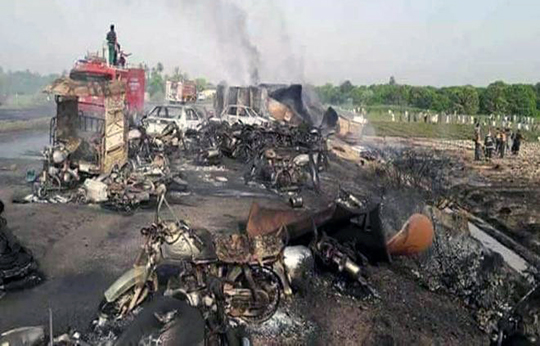Lahore, Jun 25: At least 140 people were today charred to death and over 100 others injured after an oil tanker overturned and burst into flames as crowds rushed to collect petrol that spilled out to a highway in the Bahawalpur district of Pakistan's Punjab Province.

The oil tanker coming from Karachi to Lahore overturned early this morning on the national highway at the Ahmedpur Sharqia area of the district, some 400 km from Lahore, after its tyre burst. The fire was apparently caused by someone who lit a cigarette after people from nearby localities gathered on the highway to collect spilt petrol, officials said.
The blaze from the oil spill engulfed scores of residents, killing 140 people and injuring over 100 others. District Coordination Officer (DCO) Bahwalpur Rana Salim Afzal termed it a "huge tragedy" in the history of Pakistan.
"At least 123 people were killed before getting any medical help while the rescue officials shifted more than 100 injured to the district headquarters hospital and Victoria Hospital in Bahawalpur where the condition of most of them is critical," Afzal said, adding some 50,000 litre petrol spilled from the oil tanker.
He said women and children are among the victims. Rescue 1122 official Jam Sajjad said 140 people were killed in the fire and the toll may rise further as a number of injured are in critical condition.
He said most of the dead bodies are completely charred and they will be identified only by DNA test. Muhammad Hanif, 40, who suffered burns, told reporters at Victoria Hospital that he was present at his house when his cousin called him informing that the village people were rushing to the highway to collect "free oil".
"My cousin told me to pick bottles and come out of the house. When I came out of the house I saw many people rushing towards the highway and some going there by motorcycles. Me and my cousin Rashid reached the highway and joined the people busy in collecting the petrol spilling from the tanker. Suddenly the tanker burst and the people gathered near it were burnt alive. Rashid and I were a little away from the tanker therefore we are alive," Hanif said.
He said it was "greed" of the villagers which took them to the "valley of death". The Punjab government said three helicopters are shifting the critically burnt people to Multan’s combined military hospital and Nishter Hospital for providing better health facilities.
Regional Police Officer Bahawalpur Raja Rifat said the motorway police personnel had reached the spot when the oil tanker overturned. "The people from nearby village Mauza Ramzan had also gathered there. The police personnel asked them to leave the place but they started collecting petrol. Suddenly the tanker exploded and within seconds the fire erupted giving no chance to the people present there to leave the place,” Rifat said.
Dozens of motorcycles and cars were also burnt at the site. "Most people reached the site on motorcycles to collect spilling petrol," he said. Punjab Chief Minister Shahbaz Sharif directed the authorities to ensure best medical treatment to the injured. He also sent his chopper for shifting the injured to Multan hospitals.
Prime Minister Nawaz Sharif President Mamnoon Hussain, PTI chairman Imran Khan and PPP chairman Bilawal Bhutto condoled the tragedy.
Army chief Gen Qamar Javed Bajwa ordered the Army to assist the civil administration in the rescue effort.
Army helicopters have been deployed in the rescue operations. The tragedy came a day ahead of Eid ul-Fitr celebrations in the country, marking the end of the holy fasting month of Ramazan.






Comments
Add new comment